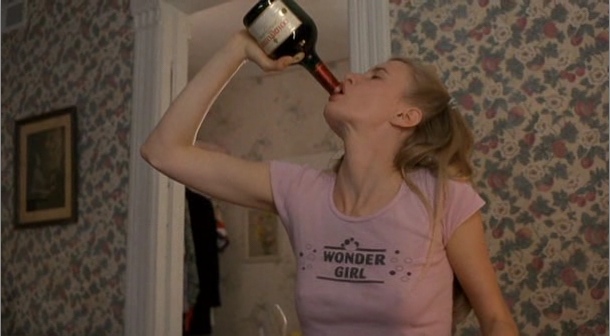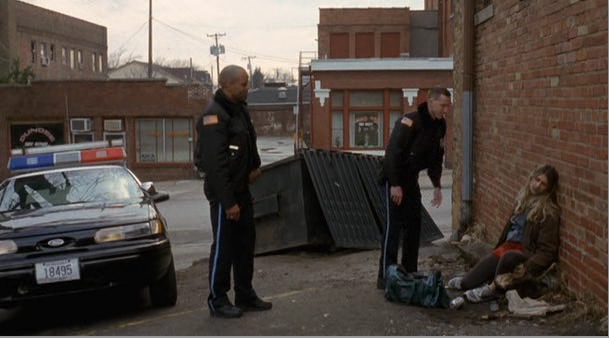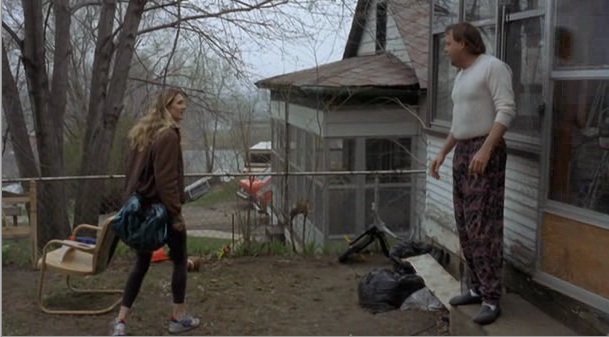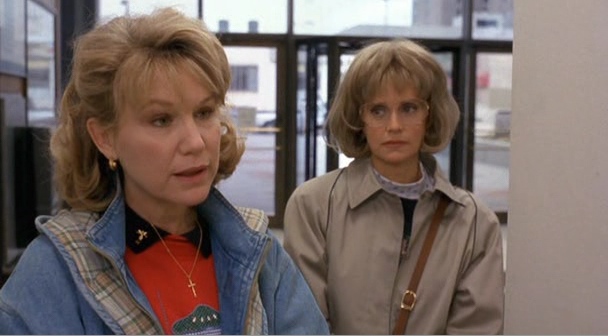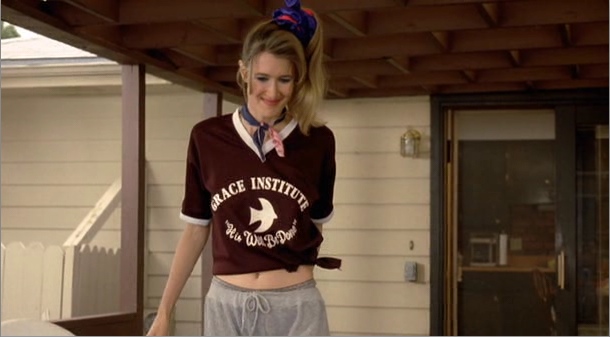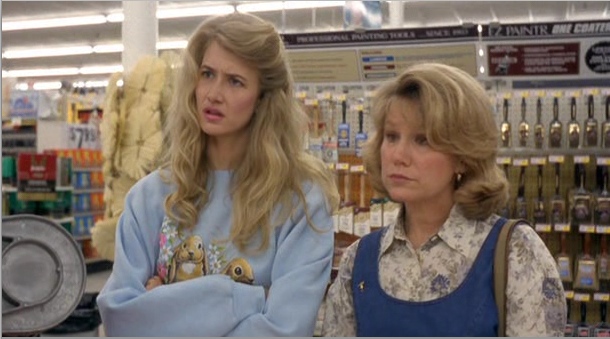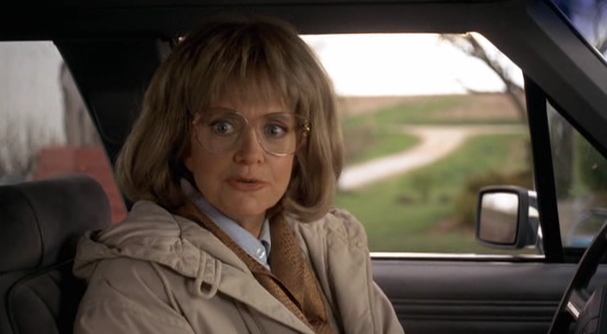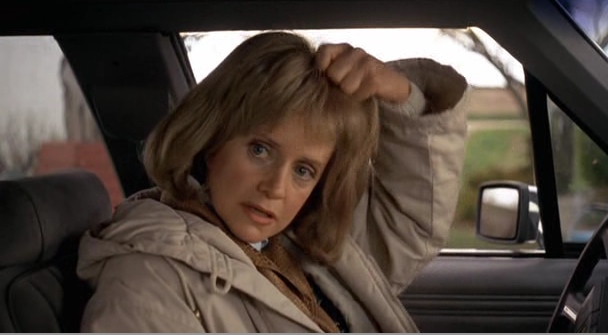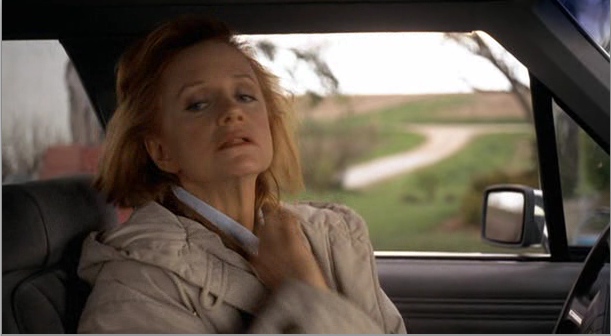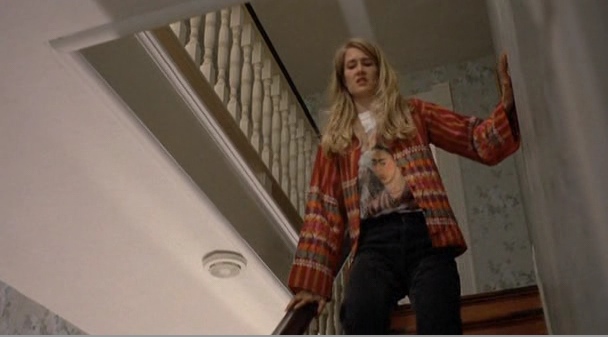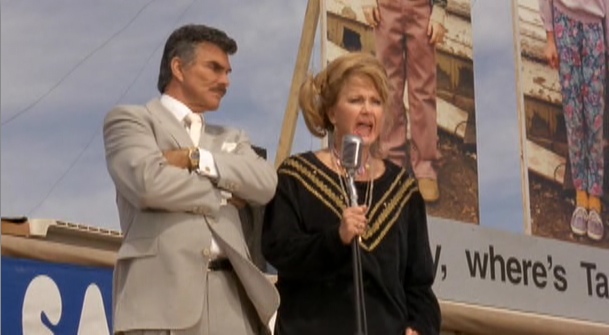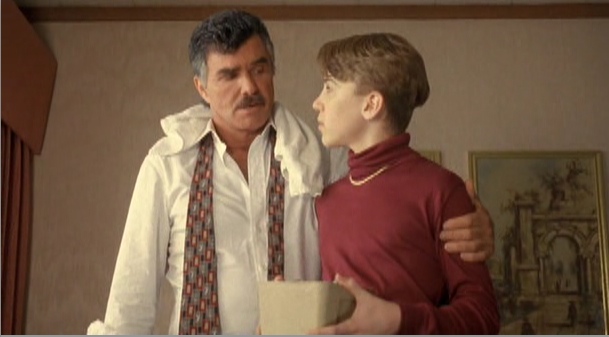|
Citizen Ruth (Payne, 1996)
Citizen Ruth Whenever I see someone less fortunate than I, Our motives in doing good are seldom as pure as we imagine them to be. Love of power is insidious; it has many disguises, and is often the source of the pleasure we derive from doing what we believe to be good to other people. How come every time I want to do something somebody tries to keep me from doing it? Why can't I ever do what I want?! Spoiler Warning: The following analysis assumes that the reader has already seen the movie. It discusses plot points and may “spoil” the experience for some. I therefore advise you to watch the movie before reading this; you can always bookmark this page, watch the movie, and come back.If, however, you want to decide whether this movie is or is not worth watching, everything above the black line is spoiler-free. Hollywood movies almost never show women getting abortions. On the way to the clinic, something always stops the mother: a beautiful picture, a scent, some plot point that's been hinted at since the movie's opening minutes. This is as convenient as it is lazy: the filmmakers get to be ostensibly pro-choice, without dealing with the uncomfortable and complicated issues of an actual abortion. Everyone gets to pat themselves on the back, feel good and go home. Thankfully, this is movie isn't that cowardly. Citizen Ruth's Ruth Stoops (played to the hilt by Laura Dern) is the worst possible candidate for pregnancy, much less motherhood: homeless, foul-mouthed, an habitual glue sniffer of conspicuously low intelligence, Ruth gets pregnant and becomes a pawn in the culture wars.
Pro-choicers and pro-lifers battle for the soul of Ruth's baby. Of course, they don't really care about the baby, so much as they care about increased power, influence and happiness. Neither side is spared criticism, and the film shines a light deep into their hypocrisies. If you feel passionately about this subject, in either direction, there will almost certainly be a moment when you feel uncomfortable. But this doesn't mean the film is gloomy. Director Alexander Payne (of Sideways and Election fame) is a gifted satirist. What might have been unbearably depressing becomes an engaging social satire. If only more filmmakers had his courage.
In one of this film's most touching scenes, Ruth goes to beg from her brother, who has custody of two of her kids. Her brother is sick and tired of her erratic behavior, and he won't let her spend the night even though she's "got nowhere else to go." When he returns to the house, to talk to his wife, Ruth sidles up the side of the house and peers, through the window, at her children. "Hey!" he snaps, obviously at the end of his rope, and beckons Ruth away from the window. "This is fifteen bucks. This is the last time. Don't you ever, ever come over here again. D'you understand me?" "How are they?" she asks him. It's one of the few times in the movie that Ruth shows interest in another human being. It's hard not to sympathize with her. Clearly, she's had some bad breaks in life; her brother's house is not exactly the picture of prosperity, either. But for the rest of the movie, Ruth is either fucking up, fucked up, spaced out or feeling like shit. She doesn't care about the media firestorm that erupts around her case; she doesn't care about politics or policies or "making a statement." All she cares about is, alternately, getting her life together, getting out of jail, getting money or getting high. Ruth's outfits should be familiar to anyone who's lived in a large American city. In addition to the "Wonder Girl" shirt, Ruth wears brown leggings, ratty sneakers and red corduroy shorts that look like they came straight out of Goodwill. In the film's first arc, she sometimes wears two or three layers of dirty-looking clothing at once. Ruth is picked up by two policemen, who are already on a first-name basis with her. She's taken in for "hazardous vapor inhalation," for the sixteenth time in the last year and a half. Ruth shows up to court in a blue uniform for jail inmates, with newly washed and combed hair. There she finds out that she's pregnant, for at least the fifth time; four kids have been taken from her (including the two we've just seen). The judge, like Ruth's brother, has had it with her. He charges her with "felony criminal endangerment" of her fetus. Is this realistic? No. According to Project Prevention, a charity which pays drug addicts to get sterilized, the parents of drug-exposed babies almost never face prosecution. It's not inconceivable (no pun intended), and this incident sparks the rest of the film's plot. Under his robe, the judge wears a blue/white striped shirt, with dark grey suspenders, a silver/grey tie and dress trousers. This might be fairly described as a "centrist democrat" outfit, though he's one of the few characters in the film without any ideology; rather, he seems motivated by pragmatism. He urges Ruth to "go to the doctor" while she's in jail, in return for leniency of her sentencing.
Enter salvation, stage right, in the form of four pro-life activists imprisoned (presumably) for some demonstration. Their permed and dyed haircuts, none which go below the shoulders, broadcast their affiliation (Christian, right-wing) just as much as their "soldiers of Christ" carol which they sing on the way into the jail cell. t's the little details in this film that take what might have been an enjoyable amateur comedy (a la But I'm A Cheerleader!) and make it close to a classic. The pro-lifer outfits are so true to life, I laughed out loud in their first scene. The jean jackets, the puffy "pie" sweaters, the little crucifixes, the white sneakers, the Mom jeans, the oversized glasses, the sandy blonde hair tied back in a ponytail––pitch perfect! From the first scene, we can almost smell their ulterior motives, especially when one says "It might sound crazy, but there are still some pretty decent people in the world." Mary Stoney (the ever-peppy Mary Kay Place) and her husband, Norm (Kurtwood Smith), take Ruth into their home. Back in her "Wonder Girl" t-shirt, Ruth takes their "doing good" without the gratitude they clearly crave; she spends two hours in the bathtub, staring at her toes and applying makeup, while the Stoneys wait politely for Ruth to "come to dinner" as their uneaten food grows cold. The Norman-Rockwell-esque details continue to amuse; Norm wears an apron with red white and blue stripes, while Mary wears a baby-blue headband and little gold earrings.
When Ruth dolls up, she does so in such a white trash fashion it's hard not to laugh (again). She even ties her "Grace Ministry" shirt's hem in a knot, exposing some of her midriff, and ties her long hair in a ponytail starting on the crown of her head. Her sweatpants expose a leopard-printed thong underneath. Enter Cheryl Stoney, the Stoney's elder daughter and black sheep of the family. With long red hair and unkempt clothing, this teenager (or early twentysomething) shares Ruth's passions for drugs and partying. She also asks Ruth right away if she's pregnant, showing us that this is probably not the first wounded bird the Stoneys have tried to heal. We now enter the second arc of the film. After a disastrous appointment at an "abortion alternative" clinic, Mary takes her to the beauty salon and lends her a pastel blue, "cute rabbit" sweater. Her hair, once a faded, dirty blonde, has now been lightened, washed and fluffed. She wears light pink lipstick, light pink blush and frosty eyeshadow. Ruth is literally remade in the image of her protectors.
See the Bertrand Russell quote at the top of this page. Throughout this part of the film, the Stoneys try to force Ruth's hand while pretending not to. When a story appears in the local paper (which it's implied, though not stated, that Norm helped put there) he reminds Ruth that "we're gonna have to decide what you're gonna tell [the news]." Two days after Ruth joins the Stoney family, they hold an in-home church service of sorts. People are unfailingly nice to her, and she's a little too thick to see that they're only nice because they want something from her. Either that, or she's too shrewd to admit knowing it. Of course it doesn't last. Ruth finds money in the back of Mary's car. She buys some alcohol and huffs their son's model airplane glue. Diane (Swoosie Kurtz), another pro-life activist, volunteers to take Ruth to her house. This is fortunate, either for Ruth or the movie, because Diane is "what you'd call a spy."
This brief but memorable scene shows how deeply appearance reflects personal philosophy. By putting on a wig and glasses, and by changing the tone of her voice, Diane literally becomes a different person. If Diane went in with her copper-red hair and modern-chic outfits, her style would belie her substance. Later, when she answers a phone call from one of the pro-lifers, she puts on the glasses to re-enter the role, even though she's on the telephone. Diane's partner, Rachel (Kelly Preston), is almost a caricature of the "liberal-arts lesbian," down to the mug of (presumably herbal) tea. She has short brown hair, circular glasses, a brown cardigan, loose khaki pants and hiking boots. When Ruth tries to run away, they tell her "we're on your side." Read that Bertrand Russell quote again. Diane "helpfully" offers Ruth to anything that's in their closet. Once again, Ruth remakes herself in the image of her benefactors: she shows up to breakfast the next morning in a Frida Kahlo shirt and an overshirt Diane picked up "in Guatemala a few years ago." In one telling exchange (like I said, the brilliance is in the details), Diane urges Ruth to try this Guatemalan shirt on, but in very passive language: "No, let's just see how it looks on [you]." Ruth is shrewd enough to offer to wear it the next day, which she does.
Ruth, of course, doesn't care about the "big, symbolic victor[ies]" that both sides are gunning for. She doesn't want to send a message––"I ain't no fuckin' telegram, bitch!" She doesn't want anybody "knowing her business" and her priorities are entirely Hobbesian. In the film's first arc she comes across as ridiculous and a little disgusting; at this point in the film, we almost admire her when compared to the self-serving hypocrites who use her to advance their own ends.
We now enter the third arc of the film. The Babysavers declare "a national alert," but Jessica Weiss (Tippi Hedren), a celebrity feminist, "might declare a counter-alert and fly down in person." As Rachel tells Ruth, "you're at the center of something really big now. It's not just about you anymore." Was it ever? Enter Blaine Gibbons (Burt Reynolds), a suave and perverted preacher, with Eric (Jeremy Sczepaniak), his young assistant/servant/boy toy of some kind. Both Blaine and Eric dress immaculately in conservative, classic menswear; Eric, who is maybe fifteen, wears a turtlenecks, checkered jackets, grey slacks and a gold chain necklace.
All of this boils over into an epic confrontation on the lawn of Diane's house. Jessica Weiss, a chic celebrity feminist, spirits Ruth away to the abortion clinic in a helicopter, while the pro-lifers, including Ruth's mother and Burt Reynolds, a perverted preacher with a boy toy, . Jessica Weiss (Tippi Hedren) is an attractive middle-aged woman with perfectly-coiffed white hair, a black pantsuit, a silk scarf and earth-toned make-up. She's "so fashionable and sensible...you know it's a cover up for unspeakable demons lurking beneath." Ruth's mother has "been saved," and her side ponytail proves it. The pro-lifers get large, blown-up photographs of two of Ruth's children (the ones with her brother, presumably) and put them on a posterboard, over the line "Mommy, where's Tanya?", a name chosen by Ruth at the "abortion alternative" clinic. We're treated to more pro-lifers in puffy overcoats and pink and blue "Babysavers" sweatshirts. Does this movie bite the bullet and show Ruth getting an abortion? Well, no, but it doesn't pull this last punch, either. Its ending is even better: Ruth, escaping the clinic with a duffel bag of cash, walks by rows and rows of irate protestors, who are absolutely oblivious to her. All the drama was never about her; it wasn't even about her baby. But now, thankfully, she's free. Citizen Ruth at Powell's. Related Reading: All images from Citizen Ruth copyright Independent Pictures. Using screenshots, for the purpose of commentary and criticism, is considered fair use in the United States. Return to Enjoy Your Style's style in film page. Return to Enjoy Your Style's home page. Not what you're looking for? Find it, below: |
Search this site:





